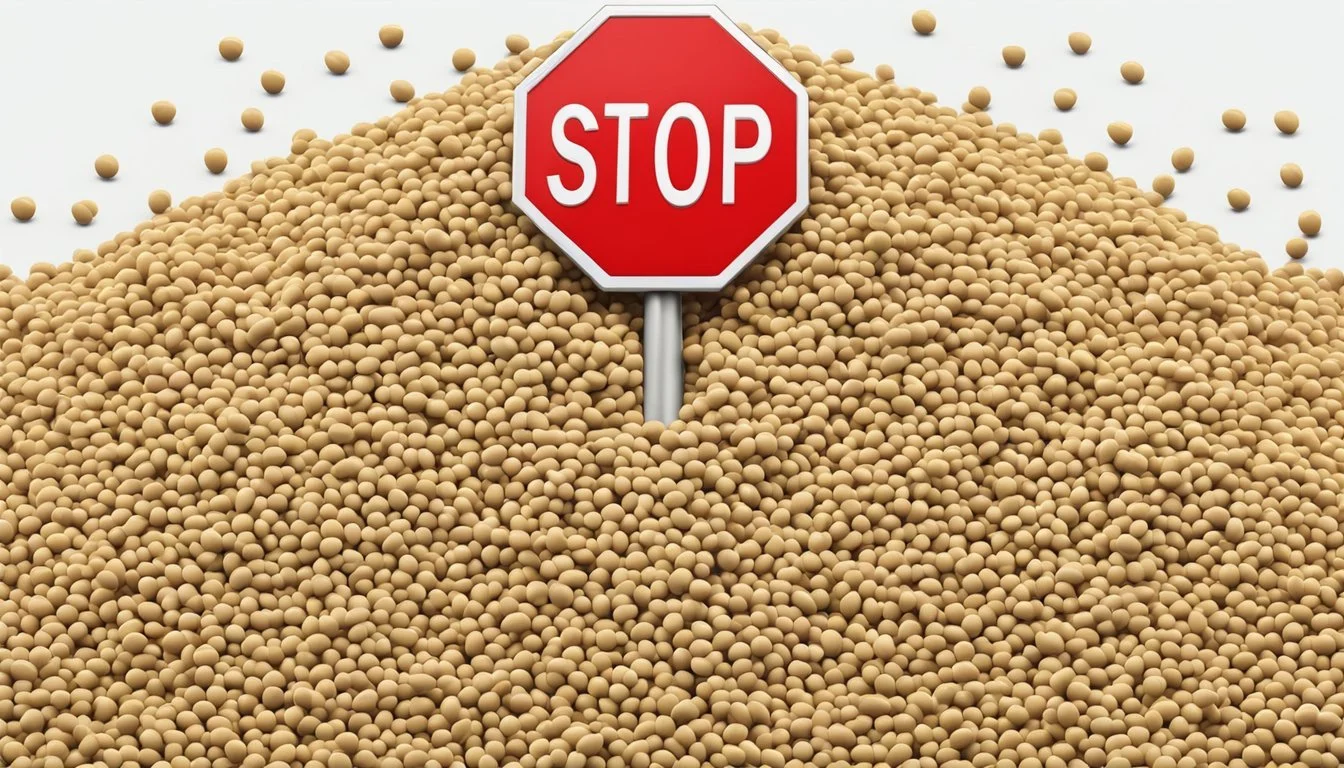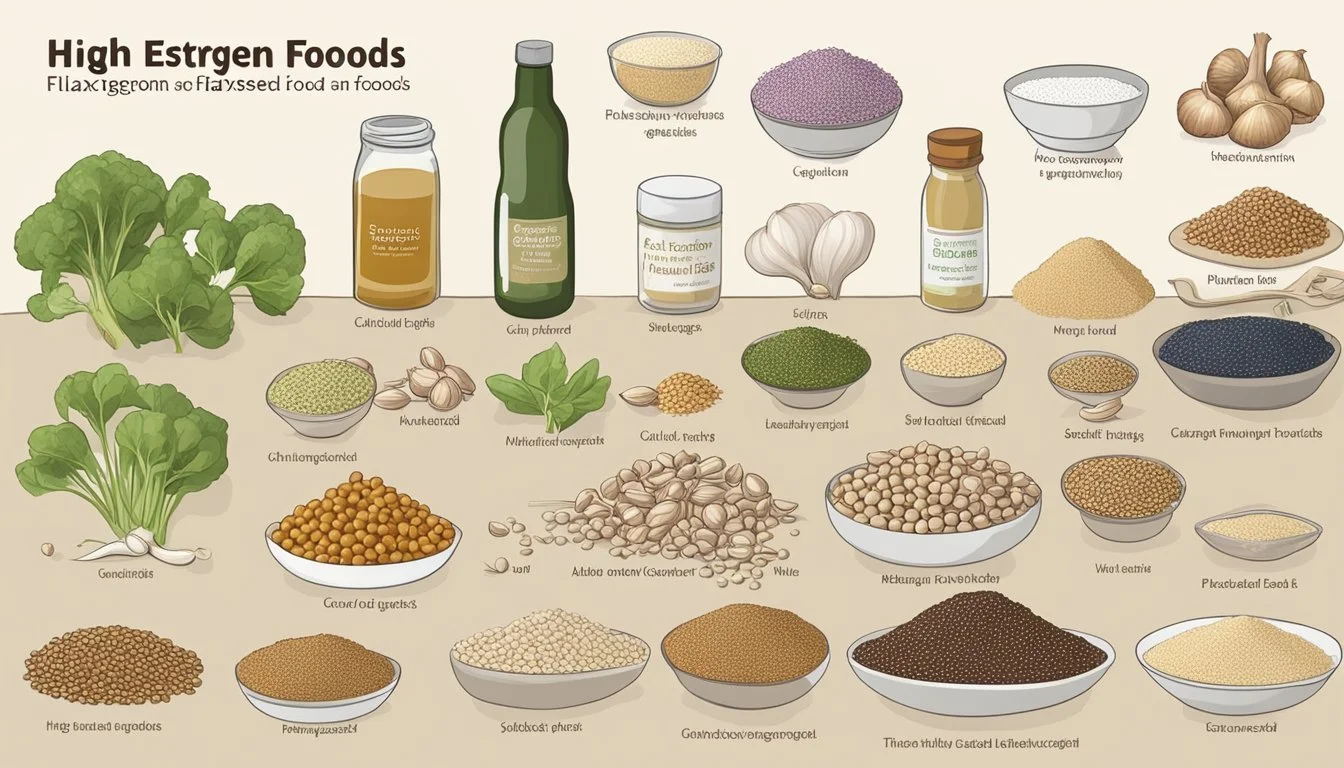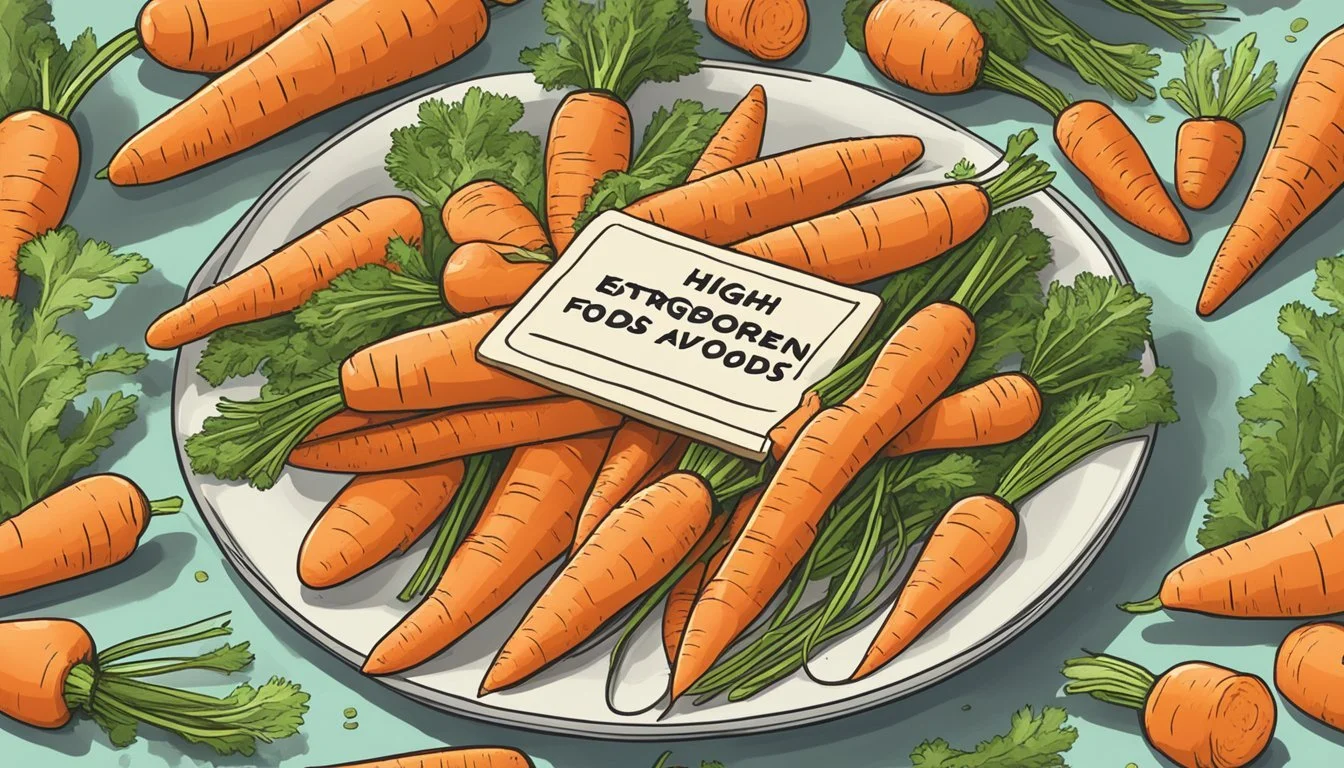8 High-Estrogen Foods to Avoid for Hormonal Balance
Health Risks and Alternatives
Managing estrogen levels through diet can be essential for various health reasons. Some foods contain high levels of phytoestrogens, which are plant compounds that can mimic or influence the hormone estrogen in the body. Understanding which foods are high in estrogen can help individuals make informed dietary choices to maintain hormonal balance.
People interested in controlling estrogen for health-related concerns may need to be cautious about their dietary intake. Certain foods, including specific fruits, vegetables, and processed products, can significantly impact estrogen levels. This article discusses these foods and provides guidance on how to manage estrogen levels effectively through diet.
1) Soybeans
Soybeans are a prominent source of phytoestrogens, specifically isoflavones. These plant-based compounds mimic estrogen in the body. When consumed in significant amounts, they can affect hormone levels.
Edamame, tofu, tempeh, and soy milk are common soybean products. They are popular in many diets thanks to their high protein content and versatility in culinary applications.
Individuals concerned about high estrogen levels might consider moderating their intake of soy-based products. Research indicates that while moderate consumption is generally safe, overconsumption could potentially influence hormone balance.
Soybeans and their derivatives are widely used in vegetarian and vegan diets. Despite their nutritional benefits, the estrogenic properties warrant attention for those monitoring their hormone levels.
Incorporating a variety of other protein sources can help maintain a balanced diet. Paying attention to soy consumption can be a key strategy in managing estrogen levels effectively.
2) Tofu
Tofu is a common soy product rich in phytoestrogens, specifically isoflavones. These plant-derived compounds exhibit estrogen-like activity in the body.
Most of the estrogen in tofu comes from these isoflavones. These levels are significant enough to impact hormonal balance if consumed in large quantities.
Eating tofu is generally safe when eaten in moderation. Current research suggests that normal dietary levels of tofu do not pose an increased risk of breast cancer due to its isoflavone content.
It is wise for individuals concerned about their estrogen levels to monitor their tofu intake. Consulting a healthcare provider can provide personalized guidance.
3) Flaxseeds
Flaxseeds are known for their nutritional benefits, including being a good source of omega-3 fatty acids and fiber. However, they also contain lignans. Lignans are a type of phytoestrogen, plant-based compounds that can mimic estrogen in the body.
For individuals with estrogen-positive breast cancer, it might be advisable to limit flaxseed intake. Studies have shown that phytoestrogens can affect hormone levels. Although they have potential cancer-fighting properties, their estrogen-like activity is a concern.
In some animal studies, flaxseed appeared to block the growth of estrogen-dependent breast cancer cells. While beneficial for some, its impact on those with certain types of cancer remains complex. Always consult healthcare providers before making dietary changes.
4) Sesame seeds
Sesame seeds are small, crunchy seeds commonly used in various cuisines, especially in Asian dishes. Despite their size, they pack a significant nutritional punch.
These seeds contain phytoestrogens, plant compounds that mimic estrogen in the body. Sesame seeds provide approximately 8 milligrams of phytoestrogens per 100 grams. This makes them a noteworthy source of these compounds.
For individuals dealing with estrogen dominance or high estrogen levels, it may be wise to monitor sesame seed consumption. While beneficial in moderation for many, those sensitive to estrogen fluctuations should take caution.
Sesame seeds are often included in salads, baked goods, and as a garnish. Being conscious of their inclusion in various foods can help manage estrogen intake.
Beyond their phytoestrogen content, sesame seeds offer other health benefits, such as improving bone health and reducing inflammation. However, for those focused on estrogen regulation, balancing these benefits with phytoestrogen levels is crucial.
5) Hummus
Hummus, made primarily from chickpeas, is a popular food that is high in estrogenic properties. Chickpeas contain significant levels of phytoestrogens, which mimic the hormone estrogen in the body.
Consuming hummus can contribute to increased estrogen levels. For individuals looking to reduce their estrogen intake, it may be advisable to limit their consumption of hummus.
Despite its health benefits, such as being rich in fiber and protein, hummus's estrogenic effects cannot be ignored. Those who need to manage estrogen levels should carefully consider how often they include it in their diet.
Many enjoy hummus as a dip or spread, making it a common addition to snacks and meals. Awareness of its estrogen content is crucial for those monitoring hormonal balance.
6) Garlic
Garlic is often celebrated for its numerous health benefits, including its ability to boost the immune system and fight infections.
However, it also contains phytoestrogens, which mimic the hormone estrogen in the body.
These compounds may influence estrogen levels, particularly in individuals who are sensitive to hormonal changes.
While garlic is not as rich in phytoestrogens as soy products or flaxseeds, its regular consumption could still have a cumulative effect.
In men, for instance, consuming large amounts of garlic might alter testosterone to estrogen balance due to its phytoestrogen content.
Garlic's impact on estrogen levels is still a topic of ongoing research, but those aiming to regulate estrogen intake might want to monitor their garlic consumption.
Although moderate use of garlic can fit into a balanced diet, those needing to avoid estrogenic foods should take note of its properties.
Considering the possible hormonal impact, consulting with a healthcare professional for personalized advice is recommended.
7) Peaches
Peaches are among the fruits that contain phytoestrogens, which are plant-derived compounds that can mimic estrogen in the body.
These compounds can influence estrogen levels, especially for those monitoring their hormone intake.
Including peaches in moderation may be wise, particularly for individuals with hormone-sensitive conditions such as estrogen-positive breast cancer.
Careful attention to diet, including fruit choices, can help manage hormone-related health issues effectively.
8) Berries
Berries, including strawberries, blueberries, and raspberries, contain phytoestrogens, which are plant-derived compounds that mimic estrogen in the body. While these fruits are nutritious, individuals looking to manage their estrogen levels might want to consume them in moderation.
Phytoestrogens in berries can contribute to elevated estrogen levels, which can be a concern for those with hormone-sensitive conditions. It's essential to balance their intake as part of a broader diet.
Moreover, berries are known for their high antioxidant content, which provides numerous health benefits. Nonetheless, for those specifically targeting estrogen reduction, choosing other fruits with lower phytoestrogen content might be beneficial.
9) Dried Fruits
Dried fruits such as apricots, dates, raisins, and prunes contain high levels of phytoestrogens. Phytoestrogens are plant compounds that can mimic the effects of estrogen in the body.
Incorporating these phytoestrogen-rich dried fruits into the diet can potentially influence estrogen levels. For individuals looking to manage or reduce their estrogen intake, consuming these dried fruits in moderation is advisable.
Studies have highlighted that dried apricots, dates, raisins, and prunes possess significant phytoestrogen content. This includes isoflavones and lignans, which are compounds known for their estrogen-like effects.
While these dried fruits offer other nutritional benefits such as fiber and vitamins, their estrogenic activity should be considered, especially for those sensitive to hormone fluctuations.
Choosing fresh fruits over dried versions may help in managing dietary intake of phytoestrogens effectively. This can be particularly important for individuals with hormone-sensitive conditions.
10) Carrots
Carrots are a popular vegetable known for their high fiber content and vibrant color. Beyond their nutritional benefits, they also contain phytoestrogens, which are plant-based compounds that can mimic estrogen in the body.
Though not as potent as some other foods, the phytoestrogens in carrots can contribute to overall estrogen levels when consumed in significant quantities.
High consumption of carrots may impact those looking to manage or reduce estrogen levels for health reasons. Nevertheless, carrots offer numerous health benefits, making them a valuable addition to most diets, provided that moderation is observed.
Understanding Estrogen
Estrogen plays a crucial role in various bodily functions, and its levels impact overall health. It's important to recognize the symptoms of high estrogen levels to manage them effectively.
Role Of Estrogen In The Body
Estrogen is a hormone primarily produced in the ovaries. It is key for the development of female secondary sexual characteristics, such as breast growth and the menstrual cycle.
In addition to reproductive functions, estrogen influences bone density, skin health, and cardiovascular function. It helps in maintaining healthy cholesterol levels and can affect mood and cognitive function.
For men, estrogen is responsible for modulating libido, erectile function, and spermatogenesis. It is also vital for maintaining a healthy balance between bone formation and resorption, supporting overall skeletal health.
Symptoms Of High Estrogen Levels
High estrogen levels can lead to several symptoms. For women, these may include weight gain, irregular menstrual cycles, and severe premenstrual syndrome (PMS). Additional symptoms involve breast tenderness and fibrocystic lumps.
Men may experience gynecomastia (enlarged breasts), erectile dysfunction, and infertility due to elevated estrogen. Both men and women might suffer from fatigue, depression, and mood swings.
It is also associated with a higher risk of certain cancers, especially breast cancer. Recognizing these symptoms early on can facilitate timely medical intervention and lifestyle adjustments to manage estrogen levels effectively.
Health Implications Of High Estrogen Foods
High estrogen foods can have significant effects on hormonal balance and may increase the risk of certain health conditions. Understanding these implications is crucial for making informed dietary choices.
Potential Impact On Hormonal Balance
Consuming foods rich in estrogen can lead to hormonal imbalances, especially in women. Phytoestrogens from sources like soy, flaxseeds, and certain nuts can mimic the body's natural estrogen.
This can result in symptoms such as mood swings, bloating, and irregular menstrual cycles. Men may also experience changes, including reduced testosterone levels. It's important to monitor dietary intake to manage these effects effectively.
Risk Factors For Certain Conditions
Elevated estrogen levels have been linked to an increased risk of hormone-sensitive cancers, such as breast and endometrial cancer. A diet high in red meat has been associated with higher estrogen levels and a greater cancer risk.
Additionally, excess estrogen can contribute to conditions like endometriosis and uterine fibroids. Monitoring and regulating dietary estrogen can help mitigate these risks.











